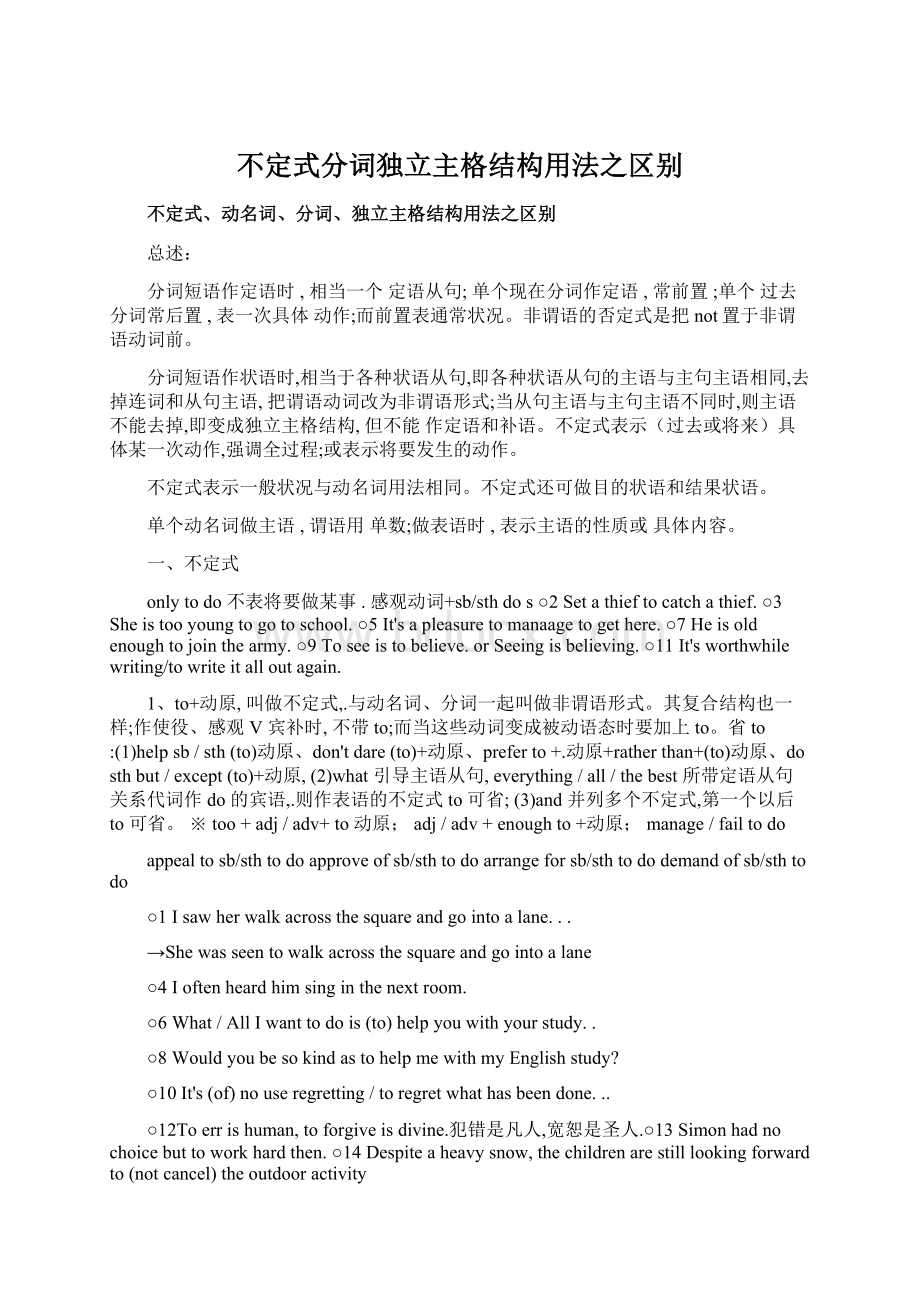不定式分词独立主格结构用法之区别Word文档下载推荐.docx
《不定式分词独立主格结构用法之区别Word文档下载推荐.docx》由会员分享,可在线阅读,更多相关《不定式分词独立主格结构用法之区别Word文档下载推荐.docx(42页珍藏版)》请在冰豆网上搜索。

其复合结构也一样;
作使役、感观V宾补时,不带to;
而当这些动词变成被动语态时要加上to。
省to:
(1)helpsb/sth(to)动原、don'
tdare(to)+动原、preferto+.动原+ratherthan+(to)动原、dosthbut/except(to)+动原,
(2)what引导主语从句,everything/all/thebest所带定语从句关系代词作do的宾语,.则作表语的不定式to可省;
(3)and并列多个不定式,第一个以后to可省。
※too+adj/adv+to动原;
adj/adv+enoughto+动原;
manage/failtodo
appealtosb/sthtodoapproveofsb/sthtodoarrangeforsb/sthtododemandofsb/sthtodo
○1Isawherwalkacrossthesquareandgointoalane...
→Shewasseentowalkacrossthesquareandgointoalane
○4Ioftenheardhimsinginthenextroom.
○6What/AllIwanttodois(to)helpyouwithyourstudy..
○8WouldyoubesokindastohelpmewithmyEnglishstudy?
○10It'
s(of)nouseregretting/toregretwhathasbeendone...
○12Toerrishuman,toforgiveisdivine.犯错是凡人,宽恕是圣人.○13Simonhadnochoicebuttoworkhardthen.○14Despiteaheavysnow,thechildrenarestilllookingforwardto(notcancel)theoutdooractivity
attheweekend.○15Myjobis(water)alltheflowersinthegarden.○16I'
mpleasedtoseeyouhere.
○17Thebestthatyoucandois(manage)thestressinthedaytominimizeitsimpactonyourhealth.
2、(un)important,dangerous,terrible,(un)fit,surprising,(im)possible,easy,hard./difficult,light/heavy,nice/beautiful,interesting,pleasant,expensive,weak等作表语时,不定式作条件、结果状语,用主动表示被动,表明说话人对不定式动作看法或建议。
○1Whydopeoplecometohislecturesinceitishardtounderstand?
○2ThecountryofAndorra(安道尔)ishardtofindontheworld'
smap.
○3Thebookisveryinterestingtoread.(条件状语)..○4Theplaceistoodifficulttogetto.(结果状语)
○5Thistypeofmusicisgoodtodanceto.(条件状语).○6Thesupermarketisexpensivetorun.
○7Thesegoodsareheavytocarry.(条件状语)→Thesegoodsaretooheavytocarry.(结果状语)
○8Thefirewas(toobig)hard(control)
3、不定式复合结构for/ofsb(sth)todo:
1)不定式复合结构作主语,表语是(im)possible,(un)necessary,(un)easy,(un)likely,(un)usual,(un)important等表示对不定式动作的客观陈述时,用for;
而表语是good,nice,kind,friendly,brave,(im)polite,(dis)honest,cruel,stupid/clever,foolish/wise,silly/bright,careless(ful),childish,lucky表说话人对不定式动作及执行者性格特征、能力特征的主观感受或评价(赞扬、赏识或责备,贬低)时,用of.
.2)作其它成份都用for.
○1Onesuggestedanswerisforfarmerstolimitthenumbersoftheircattle.(SB2AL34)
○2Thisisforyoutodecide.○3Hegaveordersfortheworktobedoneatonce.
○4It'
sverykindofyoutosendmeoff.○5It'
simportantforustoarrivethereontime.
4、1)only+不定式作结果状语,.表示出乎意料的结果;
.句子主语与不定式动作是主谓关系,.不定式用主动式;
若是动宾语关系,.用被动式,.表谓语动作后发生的又一动作,可改为and/but连接,与修饰的谓语动作并列。
to+动原作结果状语时,常与否定词连用,表结果未产生。
2)only+v-ing作结果状语,强调谓语动作所造成的结果,是顺理成章的必然结果,谓语与分词是因果关系,不能改成and或but连接,但可用andso连接;
句子谓语动词多是终极结果的动词,leave,arrive,die,end,return,breakup等;
v-ing表结果时,强调谓语动作引起该结果这个客观事实,但不是意料中必然结果。
○1Theyliftedtherocksonly(have)themdropontheirownfeet.
○2Ihurriedtothestationonly(tell)thetrainhadleftalready.
○3Hedroppedthechinaplateonthecementground,only(break)itintopieces.
○4Hewenttotheseasideonlytobedrowned..
○5Tomwaslateforclass,(criticize)bytheheadteacher.
○6Lily'
smobilephonewasleftinataxiaccidentally,never(find)again.
○7Itrainedhardalldayyesterday,only(cause)abigfloodinthisarea,forthereisn'
tnoriveratall.
○8MorehighwayshavebeenbuiltinChina,(make)itmucheasierforpeopletotravelfromoneplace
.toanother.(NMET11陕西.20)
5、不定式动词是及物V,与被修饰的n、pron是动宾关系,.且谓语动词是have,need,win等或with+n、pron,不定式用主动或被动,含义不同。
若句子主语是不定式动作执行者,不定式多用主动式;
当不定式逻辑主语
不是句子主语用被动式.therebe+n/pron+不定式(主动或被动),.其余情况该用主动式就用主动式,该用被动式就用被动式。
序数词(thefirst,thesecond,thenext,thelast等)或形容词最高级及其修饰之名词被非谓语形式修饰时,用不定式。
○1Ihavealotofwork(do)tonight.○2Haveyougotsomething(eat)?
○3I'
mgoingtoTibet.Doyouhaveanything(take)toyoursonthere?
○4Hegaveordersforthework(do).○5Therearetoomanycakes(choose)from.
.○6Onedaythemantookapairofshoes(mend).
.○7Heisalwaysthefirst(come)andthelast(leave).
.○8TuYouyoubecamethefirstChinesescientist(win)theNobelPrizeinMedicine.
6、betoblame(for)与betorent/let用主动表被动意义。
○1Youare(blame)(shouldbeblamed)foryourfaultinthejobthoughitwassmall.
○2Whois(blame)(shouldberesponsible)fortheserioustrafficaccident?
○3Thishouseis(rent)(willberented).
7、1)doany/every/no+thingbut/except/besides+(to)动原,凡谓语不是do,but等后必带to+动原。
2)cannothelp/choosebut+动原,“只好”。
3)cannotbut+.动原,实质上是2)的省略式。
○1Hecandonothingbuttelllies.○2Hecandoeverythingbutsteal.
○3Whatdoyoulikebesidestocollectstamps?
○4Intwelveyearsshealmostneverspoketomeexcepttosay“Goodmorning”.
○5Iwantnothingfromyoubut(get)yourtruefeelings.
○6Ihavenochoicebut/except(listen)toyou.
what(ever)sbcan+to动原(目的状语)
to动原(目的状语)
asmuchassbcan+to动原(目的状语)
8、非谓语形式在特定句型中的运用:
1)
.谓语+.everything/allsbcan+
2)spendasmuch(time/money)assbcan/could+v-ing(宾语)
○1Thedoctorsdidwhatevertheycould(save)theinjuredboy.
○2Thegovernmentshoulddoasmuchastheycould(protect)thenaturalenvironment.
○3Thetheorythemanstuckto(prove)right.
二、动名词
v-ing既具有动词的特点,可带自己的宾语和状语;
又具有名词的特点,做句子的主语、宾语、定语、.表语,表一般性或习惯性动作。
动名词做定语时,说明中心词的类别或用途;
做表语时,说明主语.的内容或性质。
动名词复合结构:
one'
sdoing做主语、宾语、定语、表语,陈述事件内容;
做宾语、表语时,名词用普通格,代词用宾格。
○1Hisfather'
s(come)back.safelymadethefamilyveryhappy..
○2TeachingEnglishismyjob.→MyjobisteachingEnglish
○3Thereisa(swim)poolatthebackofthegarden.
○4Thenextthinghesawwassmoke(rise)frombehindthehouse.(NMET11新课标.27)
1.只接v-ing做宾语的动词有:
suggest,consider(考虑),practise,finish,mind,enjoy,avoid,escape,delay,imagine,risk,admit,advise,tolerate(忍受),deny(否定,拒绝),miss(未做成),keep,resist(抵制),report,oppose,quit.
○1Sheavoidedansweringsuchquestions.○2Hecouldn'
tresistlaughing.
○3Wouldyoumindwaitingafewmoreminutes?
○4Ifinishedreadingthisnovellastnight.
○5Ithasstoppedraining..○6Shesuggestedbringingthemeetingtoanend.
○7Thesquirrelwasluckythatitnarrowlyescaped(catch).
2.remember/forget;
goon/stop;
mean,regret,try,want等接动名词和接不定式,其含义不同。
○1Ipostedthecard,butIforgot(do)that.
○2—Thelightintheofficeisstillon.—Oh,Iforgot(turn)itoff.
○3—Youshouldsaysorrytoyourbrother.—Yes,Iregret(quarrel)withhim.
…○4—TobuytheIMBPC686means(waste)alotofmoney.
—Really?
Idon'
tmean(waste)muchmoney.
○5Iregret(tell)youthat(遗憾地).
3.deserve,need,want,require加不定式被动式或动名词主动式。
○1Thedoorwants(repair).
○2Hefeltthathedidn'
tdeserve(give)suchagreathonor.
○3Ineed(go)therebybike,butsomethingiswrongwithit.Itneeds(repair).
.4.只接todo做宾语的动词有:
hope,wish,expect,attempt,desire,claim,(dis)agree,promise,refuse,afford,undertake(同意),prepare,plan,decide,determine,offer,beg,pretend;
manage,fail.
三、分词
..分词分为现在分词和过去分词..现在分词表主动和正在进行..过去分词表被动和已经完成。
分词可作定语、宾补;
作时间、条件、让步状语时可保留原从句连词;
作方式状语要保留连词;
作原因、结果、目的状语不保留连词;
还可作伴随状语。
having(been)done通常不作后置定语、宾补和伴随状语(三不)。
judgingfrom;
generally/strictly/franklyspeaking;
takingeverythingintoconsideration如全部考虑★everythingtakenintoconsideration/account;
remaining作前置定语(不及物),而left及物作后置定语。
一)定语:
作定语相当于定语从句。
..○1Thisisadistressinglygrievous(惨痛的)lesson(pay)forwithblood.
..○2Thelecture,(start)at7:
00pmlastnight,wasfollowedbyanobservationofthemoon
withpleasure.(NMET12湖南.31)
二)状语:
作状语相当于状语从句。
1、时间状语:
相当于before,after,since,until,when,while,as引导的时间状语从句。
○1(When)Hearingthegoodnews,wewereallexcited.
○2(When)Releasedfromthejail,hehadbeenseparatedfromhisfolksfornearly20years.
○3Children,when(accompany)bytheirparents,areallowedtoenterthestadium.
.(NMET14湖南.21)
2、条件状语:
相当于if,unless,once引导的条件状语从句;
祈使句+and(肯定)/or(否定)sbwill+动原;
有时可用n(短语)+and(肯定)/or(否定)sbwill+动原。
○1Givenanotherchance,we'
lldoitmuchbetter.→Ifwe'
regivenanotherchance,we'
lldoitmuchbetter.
○2Workingstillharder,you'
llmakegreaterprogress.○3Once(itis)lost,itwillneverbefoundagain.○5Onefulcrum(支点)tome,andIwillliftupthewholeearth.○4Workhard,oryouwon'
tsucceed.
.○6Morecourageoflovetome,andIwillpayitbackallmylife.给我爱的的勇气,我将一辈子偿还于你。
○7Time,(use)correctly,ismoneyinthebank.(NMET12湖南.23)
..○8(base)animportantdecisionmoreonemotionthanonreason,youwillregretitsoonerorlater.
(NMET12江苏.31)
3、让步状语:
相当于(al)though,eventhough(if),引导让步状语从句。
○1(Although)Admittingwhathehassaidisright,westillthinkhe'
sdishonest.
○2(Though)Seriouslywounded,thesoldierwentonfighting.
4、方式状语:
相当asif,asthough,than,引导方式状语从句,连词不省;
当从句中有itis(was)或thereis/was(were),也可省略。
○1Theactorthrewhimselffromthehorseasif(shoot).
○2Heopenedhismouthasif(speak).
○3Infact,thesituationismuchbetterthan(itwas)(expect).
5、原因状语:
相当于because,since,as等引导的原因状语从句。
○1Notknowingheraddress,wecouldn'
tgetintouchwithher.
→Becausewedidn'
tknowheraddress,wecouldn'
tgetinto